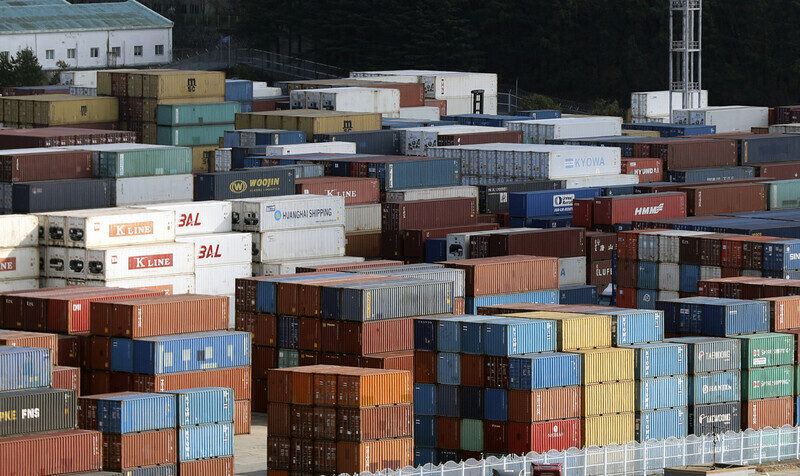hankyoreh
Links to other country sites 다른 나라 사이트 링크
75% of S. Korea’s key imports come from China, analysis shows

In its trade with the US, China, and Japan, South Korea relies on imports from China for three-quarters of key items that account for a large portion of import dollar value, an analysis shows.
According to an analysis published Monday on a study carried out by Chonbuk National University professor Choi Nam-suk at the request of the Federation of Korean Industries, 172 out of 228 items (75.5%) considered to be “key imports requiring management” originated in China.
Japan represented another 32 (14.0%), while the US accounted for 24 (10.5%).
For the report, the category of “key imports” was assigned to 228 items where South Korea relies on three countries — the US, China, or Japan — for over 90% of imports, and which rank in the top 30% in terms of import dollar value.
Some of the key import items produced in China include electronics, machinery/computers, steel, organic and inorganic compounds, glass, medical products, and industrial raw materials such as non-ferrous metals.
Prominent examples of Chinese imports include manganese, which is critical for steel manufacturing; graphite, which is an essential electric vehicle battery anode material; and magnesium, which is important for lightweight automobile production.
Key imports from Japan include electronics, machinery/computers, plastics, and organic compounds for electronics. Some of the Japanese-made items requiring management include polyimide film, which is used for foldable displays, and machinery and spraying equipment for processing semiconductor wafers.
Key imports from the US include petroleum/coal, aircraft, electronics, fruit, and machinery/computers.
Identifying 133 items as having global supply chain stability vulnerabilities with high volumes of transactions between companies, the report called for the establishment of an early warning management system for them. Chinese-made items accounted for 127 of them, or 95.4%, including tungsten oxide (used in semiconductors), calcium chloride, graphics cards, solar cell modules, and pesticide ingredients.
“Failure to manage supply and demand for key import items could result in supply crises erupting at any time, as witnessed with the urea water solution situation,” Choi said.
“An ongoing monitoring system will need to be established for the 228 items, along with measures such as import diversification,” he added.
By Kim Hoe-seung, senior staff writer
Please direct questions or comments to [english@hani.co.kr]

Editorial・opinion
![[Editorial] Does Yoon think the Korean public is wrong? [Editorial] Does Yoon think the Korean public is wrong?](https://flexible.img.hani.co.kr/flexible/normal/500/300/imgdb/original/2024/0417/8517133419684774.jpg) [Editorial] Does Yoon think the Korean public is wrong?
[Editorial] Does Yoon think the Korean public is wrong?![[Editorial] As it bolsters its alliance with US, Japan must be accountable for past [Editorial] As it bolsters its alliance with US, Japan must be accountable for past](https://flexible.img.hani.co.kr/flexible/normal/500/300/imgdb/original/2024/0417/6817133413968321.jpg) [Editorial] As it bolsters its alliance with US, Japan must be accountable for past
[Editorial] As it bolsters its alliance with US, Japan must be accountable for past- [Guest essay] Amending the Constitution is Yoon’s key to leaving office in public’s good graces
- [Editorial] 10 years on, lessons of Sewol tragedy must never be forgotten
- [Column] A death blow to Korea’s prosecutor politics
- [Correspondent’s column] The US and the end of Japanese pacifism
- [Guest essay] How Korea turned its trainee doctors into monsters
- [Guest essay] As someone who helped forge Seoul-Moscow ties, their status today troubles me
- [Editorial] Koreans sent a loud and clear message to Yoon
- [Column] In Korea’s midterm elections, it’s time for accountability
Most viewed articles
- 1‘Right direction’: After judgment day from voters, Yoon shrugs off calls for change
- 2[Editorial] Does Yoon think the Korean public is wrong?
- 3Strong dollar isn’t all that’s pushing won exchange rate into to 1,400 range
- 4Where Sewol sank 10 years ago, a sea of tears as parents mourn lost children
- 5Japan officially says compensation of Korean forced laborers isn’t its responsibility
- 6[Editorial] As it bolsters its alliance with US, Japan must be accountable for past
- 7[News analysis] Watershed augmentation of US-Japan alliance to put Korea’s diplomacy to the test
- 8Korea ranks among 10 countries going backward on coal power, report shows
- 9Faith in the power of memory: Why these teens carry yellow ribbons for Sewol
- 10[Guest essay] Amending the Constitution is Yoon’s key to leaving office in public’s good graces